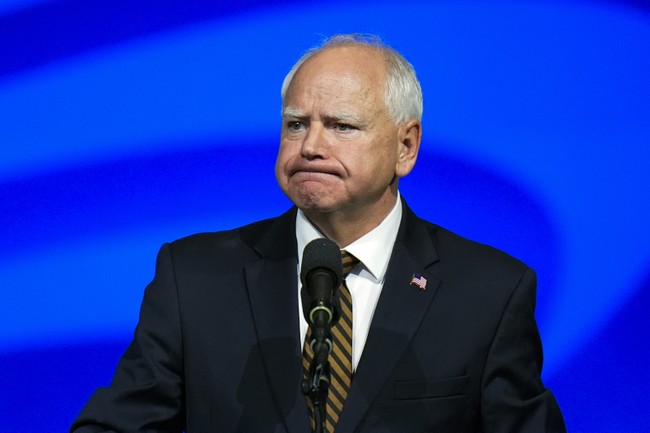This looks slightly more serious as an instance of political dishonesty than the Case of the Missing Big Mac, but maybe not by much. Apparently, a story told by Tim Walz about the George Bush campaign provoking him into a career in electoral politics has some serious holes in it. But is it far enough off from the truth to matter these days?
If a Democrat’s origin story falls in the forest, will the media report it even if people are around to hear it?
Earlier this afternoon, investigative reporter Gabe Kaminsky dug into a tale told by Walz that claimed he had only chosen a career in politics after getting denied entrance to a Bush campaign rally in Mankato, along with two students he brought with him for the “educational experience.” Supposedly, a Kerry sticker on one of the students’ wallets prompted a staffer to rebuff their efforts to enter the rally.
Or so Walz’ story goes. Kaminsky has a different explanation at the Washington Examiner, one that puts a different light on Coach Walz’ claims. For one thing, Walz actually did get into the rally. The teenagers weren’t his students either, and they had provoked a confrontation with the campaign a few days earlier:
That’s because Klaber and Burkhart had a public confrontation with the Bush campaign days before the 2004 rally. The teenagers were heard making “unfavorable comments” about Bush as they waited in line and were initially denied tickets, according to an archived news report.
After the story was reported by local news, because Klaber called the press, the Bush campaign contacted the teenagers and offered them tickets. In the lead-up to the 2004 election, there was heightened protest activity as police made arrests at campaign events. Klaber’s parents knew Walz and asked him to chaperone the teenagers to the event, expecting they may run into a problem.
They did: That day, as the trio waited in line, Bush campaign staffers told them that the Secret Service deemed Klaber and Burkhart a threat. Walz, in his retelling of the matter in 2006, said he was indignant. “As a soldier, I told them I had a right to see my commander in chief,” Walz said at a 2006 campaign event in Minnesota.
The Bush campaign staffers interrogated Walz and wanted to know if he supported Bush, according to Walz. But while the students were barred from the event, Walz was not, and walked right inside, one source said.
First off, the Secret Service decision was probably an overreaction — but that was their overreaction, not the campaign’s. But it started with the two teenagers acting out while waiting in line for the tickets, and the one escalated the situation by going to the media. That certainly would have put them on the Secret Service’s radar, for reasons that make a lot more sense after July 13. Don’t forget too that the Iraq war had touched off widespread protests, not all of them peaceful, and the Secret Service had to consider that when dealing with known activists attempting to get into election rallies.
Still, the details may not match up, but the differences are perhaps not starkly black-and-white. But was this truly Walz’ political awakening? Not really:
In ‘04, I worked for the MNGOP. President Bush visited Mankota on August 4, 2004, and I took pictures of protesters outside the event. Tim Walz (pictured on the far-right) protested Bush’s visit to Minnesota. The thread below from Walz about his role at Bush’s event is dishonest. https://t.co/rEpzoF0yE9 pic.twitter.com/ygLiIEG4p1
— Michael Brodkorb (@mbrodkorb) August 17, 2020
Follow the thread, though, because Klaber and Brodkorb mixed it up on Twitter/X over this argument in 2020 (via the Daily Wire). Klaber insisted that their intent on entering the rally wasn’t to protest inside, but as Brodkorb rebuts, that’s not the point. Walz wasn’t there as a disinterested observer but a political activist protesting Bush’s presence in Mankato at that time.
And this leaves us … where, exactly? Maybe it didn’t go down like Walz claims, but at least some of the elements are not in dispute. Kaminsky’s report cautiously allows room for that, claiming that Walz’ story has “significant inaccuracies” rather than being a false explanation. Walz may have been willing to protest Bush over the war — and this certainly puts his snap retirement rather than deployment in a different and less-flattering light too — but maybe he didn’t have electoral ambitions before then, too. Who’s to say when he got inspired to run for office? We know that Walz didn’t run for office until the next cycle.
Anyway, this seems like the picking of irrelevant nits. His lack of honesty and transparency over his sudden retirement is more concerning, but even that is not going to resonate with voters. Walz’ record as a COVID fascist and a failed leader when it mattered in the Minneapolis riots matters much more than any of this — and he’s only the running mate, so voters may not really focus much on Walz for any reason. That certainly turned out to be true in 2020 with Harris herself.
Worth noting and cataloguing perhaps, but we have so much more on which to focus.
Read the full article here






![Joe Biden Shocks Kamala Harris with Wildfire Remark That Leaves Her Speechless [WATCH] Joe Biden Shocks Kamala Harris with Wildfire Remark That Leaves Her Speechless [WATCH]](https://www.lifezette.com/wp-content/uploads/2025/01/2025.01.10-01.35-lifezette-67812207187ea.jpg)


